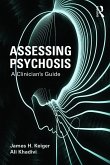Psychotic Disorders
Comprehensive Conceptualization and Treatments
Herausgeber: Tamminga, Carol A; Ivleva, Elena; Reininghaus, Ulrich; Os, Jim Van
Psychotic Disorders
Comprehensive Conceptualization and Treatments
Herausgeber: Tamminga, Carol A; Ivleva, Elena; Reininghaus, Ulrich; Os, Jim Van
- Gebundenes Buch
- Merkliste
- Auf die Merkliste
- Bewerten Bewerten
- Teilen
- Produkt teilen
- Produkterinnerung
- Produkterinnerung
The volume provides a comprehensive review of cutting-edge topics and treatment approaches to one of the most complex and fascinating brain disorders: psychosis. More than 70 leading experts in the field world-wide cover a broad range of topics on clinical, neurobiological, and treatment-related aspects of psychotic disorders. Chapters present a novel approach to psychotic disorders, emphasizing its dimensional nature and complexities of its underlying mechanisms incorporating both biological and psychosocial factors.
Andere Kunden interessierten sich auch für
![Assessing Psychosis Assessing Psychosis]() Ali Khadivi (Private Practice, New York, NY, USA)Assessing Psychosis61,99 €
Ali Khadivi (Private Practice, New York, NY, USA)Assessing Psychosis61,99 €![AN AMAZING JOURNEY INTO THE PSYCHOTIC MIND - BREAKING THE SPELL OF THE IVORY TOWER AN AMAZING JOURNEY INTO THE PSYCHOTIC MIND - BREAKING THE SPELL OF THE IVORY TOWER]() Jerry Marzinsky Sherry SwineyAN AMAZING JOURNEY INTO THE PSYCHOTIC MIND - BREAKING THE SPELL OF THE IVORY TOWER20,99 €
Jerry Marzinsky Sherry SwineyAN AMAZING JOURNEY INTO THE PSYCHOTIC MIND - BREAKING THE SPELL OF THE IVORY TOWER20,99 €![Management of Complex Treatment-resistant Psychotic Disorders Management of Complex Treatment-resistant Psychotic Disorders]() Management of Complex Treatment-resistant Psychotic Disorders94,99 €
Management of Complex Treatment-resistant Psychotic Disorders94,99 €![House of Psychotic Women: Expanded Edition House of Psychotic Women: Expanded Edition]() Kier-La JanisseHouse of Psychotic Women: Expanded Edition39,99 €
Kier-La JanisseHouse of Psychotic Women: Expanded Edition39,99 €![Wakenhyrst Wakenhyrst]() Michelle PaverWakenhyrst9,49 €
Michelle PaverWakenhyrst9,49 €![Psychotic Reactions and Carburetor Dung Psychotic Reactions and Carburetor Dung]() Lester BangsPsychotic Reactions and Carburetor Dung10,99 €
Lester BangsPsychotic Reactions and Carburetor Dung10,99 €![Symbiosis and Ambiguity Symbiosis and Ambiguity]() José BlegerSymbiosis and Ambiguity51,99 €
José BlegerSymbiosis and Ambiguity51,99 €-
-
-
The volume provides a comprehensive review of cutting-edge topics and treatment approaches to one of the most complex and fascinating brain disorders: psychosis. More than 70 leading experts in the field world-wide cover a broad range of topics on clinical, neurobiological, and treatment-related aspects of psychotic disorders. Chapters present a novel approach to psychotic disorders, emphasizing its dimensional nature and complexities of its underlying mechanisms incorporating both biological and psychosocial factors.
Hinweis: Dieser Artikel kann nur an eine deutsche Lieferadresse ausgeliefert werden.
Hinweis: Dieser Artikel kann nur an eine deutsche Lieferadresse ausgeliefert werden.
Produktdetails
- Produktdetails
- Verlag: Oxford University Press Inc
- Seitenzahl: 708
- Erscheinungstermin: 3. November 2020
- Englisch
- Abmessung: 282mm x 221mm x 46mm
- Gewicht: 2206g
- ISBN-13: 9780190653279
- ISBN-10: 0190653272
- Artikelnr.: 60360800
- Herstellerkennzeichnung
- Libri GmbH
- Europaallee 1
- 36244 Bad Hersfeld
- gpsr@libri.de
- Verlag: Oxford University Press Inc
- Seitenzahl: 708
- Erscheinungstermin: 3. November 2020
- Englisch
- Abmessung: 282mm x 221mm x 46mm
- Gewicht: 2206g
- ISBN-13: 9780190653279
- ISBN-10: 0190653272
- Artikelnr.: 60360800
- Herstellerkennzeichnung
- Libri GmbH
- Europaallee 1
- 36244 Bad Hersfeld
- gpsr@libri.de
Carol A. Tamminga, MD is Professor, Chairman of Psychiatry and Chief of Translational Neuroscience Research in Schizophrenia at the University of Texas Southwestern Medical School. She holds the Communities Foundation of Texas Chair in Brain Science along with the Lou and Ellen McGinley Distinguished Chair in Psychiatric Research. She directs clinical and preclinical research in schizophrenia focused on identifying disease mechanisms and on improving treatments. Dr. Tamminga has been the recipient of numerous federal and foundation grants, as well as Award in the field. She has served on the National Advisory Mental Health Council, NIMH and the Council of the National Institute of Drug Abuse. The goal of Dr. Tamminga's research is to examine and understand the mechanisms underlying schizophrenia, especially its most prominent symptoms, psychosis and memory dysfunction, in order to build rational treatments for the illness. Elena I. Ivleva, MD, PhD is a psychiatrist and neuroscientist specializing in psychotic disorders. Dr. Ivleva completed her medical training, psychiatry residency and PhD in Neuroscience at the Voronezh State Medical Academy, Russia. She subsequently completed postdoctoral research fellowship in translational schizophrenia research, as well as psychiatry residency, at UT Southwestern Medical Center, Dallas. Since 2012, Dr. Ivleva has been a faculty member at the Department of Psychiatry at UT Southwestern Medical Center. She is also a director of clinical and research Early Psychosis Program at UT Southwestern. Dr. Ivleva's research is focused on understanding neurobiological mechanisms of psychosis, and developing brain-based biomarkers for psychotic illness. The ultimate goal of her research is to develop objective, measurable biomarkers which could inform future diagnostic algorithms and mechanism-based treatments for psychotic disorders. Ulrich Reininghaus, PhD, is Heisenberg Professor at the Department of Public Mental Health, Central Institute of Mental Health (CIMH), Mannheim, and a Visiting Professor at the Health Service and Population Research Department, Institute of Psychiatry, Psychology and Neuroscience, King's College London. Professor Reininghaus has been awarded several competitive fellowships and personal grants for his work, including a Research Training Fellowship by the UK National Institute for Health Research (NIHR), an NIHR Postdoctoral Fellowship, a Veni grant by the Netherlands Organisation for Scientific Research (NWO), a ZonMw research programme grant, and most recently a Heisenberg Professorship by the German Research Foundation to establish the new Department of Public Mental Health at CIMH. He is also Associate Editor and commissions the state-of-the-art review series of the international peer-reviewed journal Social Psychiatry and Psychiatric Epidemiology. Jim van Os MD, PhD, is Professor of Psychiatric Epidemiology and Chairman of the Division Neuroscience at Utrecht University Medical Centre, Utrecht, The Netherlands, and Visiting Professor of Psychiatric Epidemiology at the Institute of Psychiatry, London. He is on the editorial board of numerous European and US psychiatric journals and an Academic Editor at PLoS ONE. In 2011, he was elected member of the Royal Netherlands Academy of Arts and Sciences (KNAW); in 2016 he became a Fellow at King's College London; and since 2014, he has appeared on the Thomson-Reuter Web of Science list of the worlds' "most influential scientific minds' of our time. He leads the Division Neuroscience at Utrecht University Medical Centre and is actively involved in mental health reform in the Netherlands as well as Science in Transition, a movement that works towards making scientific research more relevant and impactful.
* Section 1: Phenomenological characteristics and dimensional
conceptualization of psychosis
* 1. Conceptualization of psychosis in psychiatric nosology: past,
present and the future
* Matcheri S. Keshavan, John Torous, Rajiv Tandon
* 2. Historical epistemology of the "unitary psychosis"
* German E. Berrios, Ivana S. Marková
* 3. Dimensional conceptualization of psychosis
* Kürsat Altinbas, Sinan Guloksuz, and Jim van Os
* Transdiagnostic dimensions of psychosis
* 4. Applying Research Domain Criteria (RDoC) Dimensions to psychosis
* Sarah E. Morris, Jennifer Pacheco, Charles A. Sanislow
* 5. Schizophrenia, Schizoaffective disorder, Bipolar Disorder
* Barrett Kern, Sarah K. Keedy
* 6. Psychotic symptoms in bipolar disorder
* Marsal Sanches, Xiang-Yang Zhang, and Jair C. Soares
* 7. Major depressive disorder with psychotic features: confronting and
resolving the dimensional challenge
* John L. Waddington, Tara Kingston, Nnamdi Nkire, Vincent Russell
* 8. Psychosis in Personality Disorders
* Nidhi Kapil-Pair, Yulia Landa, Marie C. Hansen, Daniel H. Vaccaro,
Marianne Goodman
* 9. Symptom network models of psychosis
* Adela-Maria Isvoranu, Lindy-Lou Boyette, Sinan Guloksuz, Denny
Borsboom
* Psychosis in general medical conditions and organic brain disorders
* 10. Organic psychosis: phenotypic deviants or clues to schizophrenia?
* Peter Buckley, Brian Miller
* 11. Epilepsy and psychosis
* Michael R. Trimble, Kousuke Kanemoto, Dale C. Hesdorffer
* 12. Understanding sex differences in psychosis through the
exploration of hormonal contributions
* Leah H. Rubin
* Section 2: Psychosis course and lifetime manifestations
* Early Psychosis
* 13. Clinical phenomenology of the prodrome for psychosis
* Albert R. Powers III, Thomas H. McGlashan, Scott W. Woods
* 14. Predictors of conversion to psychosis
* Rachael G. Grazioplene, Tyrone D. Cannon
* 15. First-episode psychosis: phenomenology, onset, course and early
intervention (OPUS)
* Merete Nordentoft, Nikolai Albert
* 16. Evidence based treatment and implementation for early psychosis
* Sacha Zilkha, Iruma Bello, Hong Ngo, Samantha Jankowski, Lisa Dixon
* Psychosis Over Life Span and Late-Life Psychosis
* 17. Life span development of schizophrenia: symptoms, clinical course
and outcomes
* Matt Isohanni, Jouko Miettunen, Matti Penttilä
* 18. Phenomenological characteristics of psychosis of aging: psychosis
and dementia interphase
* Graham M.L. Eglit, Barton W. Palmer, Dilip V. Jeste
* Section 3: Neurobiology of psychosis
* Heritability and Genetics
* 19. Genetic neuropathology revisited: gene expression in psychosis
* Samuel J. Allen; Rahul Bharadwaj,, Thomas M. Hyde, Joel E. Kleinman
* 20. Epigenomic regulation in psychosis
* Bibi S. Kassim, Behnam Javidfar, Schahram Akbarian
* 21. DNA modifications in schizophrenia
* Ehsan Pishva, Bart P. F. Rutten, Jonathan Mill
* 22. Endophenotypes: a window on the genetics of schizophrenia
* David Braff
* Cognitive Biomarkers of psychosis
* 23. Cognitive biomarkers of psychosis
* S. Kristian Hill, Richard S.E. Keefe, John A. Sweeney
* 24. Social cognition in psychosis
* Amy E. Pinkham, David L. Roberts
* 25. Self-awareness in schizophrenia: affected domains and their
impact
* Juliet M. Silberstein, Amy E. Pinkham, Philip D. Harvey
* Neurophysiologic biomarkers of psychosis
* 26. Neurophysiologic biomarkers of psychosis: Event-related potential
biomarkers
* Judith M. Ford, Holly K. Hamilton, Katiah Llerena, Brian J. Roach,
Daniel H. Mathalon
* 27. Oculomotor biomarkers of illness, risk, and pharmacogenetic
treatment effects across the psychosis spectrum
* James L Reilly, Jennifer McDowell, Jeffrey Bishop, Andreas Sprenger,
Rebekka Lencer
* Brain imaging biomarkers
* 28. Structural connectivity in psychosis
* Amanda E. Lyall, Johanna Seitz, Marek Kubicki
* 29. Functional connectivity biomarkers of psychosis
* Godfrey Pearlson, Michael Stevens
* 30. MR Spectroscopy
* Adrienne C. Lahti, Nina V. Kraguljac
* Pathophysiology of Psychosis: Neurotransmitters
* 31. Dopaminergic mechanisms underlying psychosis
* Oliver Howes and Michael Bloomfield
* 32. Glutamate in the pathophysiology of schizophrenia
* Daniel C. Javitt
* 33. GABAergic Mechanisms in Psychosis
* Takanori Hashimoto, David A Lewis
* 34. Alteration in nicotinic receptors in psychotic disorders:
molecular neurobiology and clinical relevance
* Robert Freedman
* 35. Muscarinic acetylcholine receptors in the etiology and treatment
of schizophrenia
* M.S. Moehle, S. E. Yohn, and P. J. Conn
* 36. Kynurenic acid in brain function and dysfunction: focus on the
pathophysiology and treatment of schizophrenia
* Robert Schwarcz and Sophie Erhardt
* Pathophysiology: Voltage-gated ion channels in psychosis
* 37. Genetic Association of Voltage-gated Ion Channels with Psychotic
Disorders
* Charles H Large
* 38. Voltage-gated Ion channels in neural circuits implicated in
psychotic disorders
* Charles H Large
* Pathophysiology: Immune Mechanisms
* 39. Inflammatory mechanisms in psychosis
* Anna P. McLaughlin, Carmine M. Pariante, Valeria Mondelli
* 40. Autoimmune processes in mental disorders
* Marina Mané-Damas, Carolin Hoffmann, Shenghua Zong, Peter C.
Molenaar, Mario Losen, Pilar Martinez-Martínez
* Brain circuit alterations in psychosis
* 41. The circuitry of midbrain dopamine system dysregulation in
schizophrenia
* Felipe V. Gomes, Eric C. Zimmerman, Anthony A. Grace
* 42. Feeling and remembering: effects of psychosis on the structure
and function of the amygdala and hippocampus
* M.D. Bauman, J.D. Ragland, C.M. Schumann
* 43. The cerebellum in psychosis
* Kelsey Heslin, Joe Shaffer, Albert Powers, Nancy Andreasen, and
Krystal Parker
* Section 4: Socio-environmental mechanistic factors in psychosis
* Early life adversity
* 44. Perinatal factors in psychosis
* Mary Clarke, Mary Cannon
* 45. The role of early life experience in psychosis
* Richard P. Bentall
* 46. Socio-environmental adversity across the life span
* Peter Bosanac, David Castle
* 47. Migration, ethnicity, and psychoses
* Craig Morgan
* Psychological mechanisms and psychosis
* 48. Cognitive and emotional processes in psychosis
* Steffen Moritz, Thies Lüdtke, Lukasz Gaweda, Jakob Scheunemann, and
Ryan P. Balzan
* 49. Aberrant salience attribution and psychosis
* Toby T. Winton- Brown and Shitij Kapur
* Neural correlates of socio-environmental risk and psychosis
* 50. Neural correlates of childhood trauma
* Alaptagin Khan, Kyoko Ohashi, Maria Maierd, Martin H. Teicher
* 51. Neural correlates of urban risk environments
* Imke L.J. Lemmers-Jansen, Anne-Kathrin J. Fett, Lydia Krabbendam
* 52. Neural correlates of ethnic minority position and risk for
psychosis
* Jean-Paul Selten, Jan Booij, Bauke Buwalda, Andreas Meyer-Lindenberg
* 53. Resilience in psychosis spectrum disorder
* Lotta-Katrin Pries, Sinan Guloksuz, Bart P. F. Rutten
* Section 5: Treatment of psychotic disorders
* Pharmacological Treatments
* 54. Pharmacological approaches to treatment
* Stefan Leucht, Andrea Cipriani, Toshi A. Furukawa
* 55. Animal models of psychosis: approaches and validity
* Daniel Scott
* Psychological treatments in psychosis
* 56. Psychoanalytic treatment of psychosis
* Elyn R. Saks
* 57. Cognitive-behavioral therapy
* Tania Lincoln, Alison Brabban
* 58. Psychoeducation as an approach to treatment of severe mental
illness
* Emma Sophia Kay, David E. Pollio, Carol S. North
* 59. Family Interventions in psychosis
* Juliana Onwumere, Elizabeth Kuipers
* 60. Peer support for people with psychiatric illness: A comprehensive
review
* Chyrell D. Bellamy, Anne S. Klee, Xavier Cornejo, Kimberly Guy, Mark
Costa, Larry Davidson
* 61. Mind-body approaches, mindfulness
* Louise Johns, Mark Hayward, Clara Strauss, Eric Morris
* 62. Hearing voices groups
* Alison Branitsky, Eleanor Longden and Dirk Corstens
* 63. AVATAR Therapy: a new digital therapy for Auditory Verbal
Hallucinations
* Tom K.J. Craig, Mar Rus-Calafell
* 64. Health in a connected world
* Philippe Delespaul and Catherine van Zelst
* 65. Recovery-oriented services
* Mike Slade, Eleanor Longden, Julie Repper, Samson Tse
* Cognitive Remediation and Other Approaches
* 66. Neuroscience-informed cognitive training for psychotic spectrum
illnesses
* Sophia Vinogradov, Rana Elmaghraby, Laura Pientka
* 67. Cognitive remediation: theory, meta-analytic evidence, and
practice
* Til Wykes and Adam Crowther
* 68. Noninvasive brain stimulation techniques in psychosis
* Marine Mondino, Frédéric Haesebaert, Jérôme Brunelin
* Early interventions
* 69. Treatment approaches in the psychosis prodrome
* Andrea M. Auther and Barbara A. Cornblatt
* 70. From early intervention in psychosis to transformation of youth
mental health reform
* Ashok Malla, Patrick McGorry
* Section 6: Future directions and opportunities
* 71. Future directions: making a start towards the primary prevention
of psychosis
* Robin M Murray, Olesya Ajnakina and Marta Di Forti
* 72. A glimpse forward regarding psychopathology of psychotic
disorders
* William T. Carpenter
* 73. Time for change in psychosis research
* Brett A. Clementz
conceptualization of psychosis
* 1. Conceptualization of psychosis in psychiatric nosology: past,
present and the future
* Matcheri S. Keshavan, John Torous, Rajiv Tandon
* 2. Historical epistemology of the "unitary psychosis"
* German E. Berrios, Ivana S. Marková
* 3. Dimensional conceptualization of psychosis
* Kürsat Altinbas, Sinan Guloksuz, and Jim van Os
* Transdiagnostic dimensions of psychosis
* 4. Applying Research Domain Criteria (RDoC) Dimensions to psychosis
* Sarah E. Morris, Jennifer Pacheco, Charles A. Sanislow
* 5. Schizophrenia, Schizoaffective disorder, Bipolar Disorder
* Barrett Kern, Sarah K. Keedy
* 6. Psychotic symptoms in bipolar disorder
* Marsal Sanches, Xiang-Yang Zhang, and Jair C. Soares
* 7. Major depressive disorder with psychotic features: confronting and
resolving the dimensional challenge
* John L. Waddington, Tara Kingston, Nnamdi Nkire, Vincent Russell
* 8. Psychosis in Personality Disorders
* Nidhi Kapil-Pair, Yulia Landa, Marie C. Hansen, Daniel H. Vaccaro,
Marianne Goodman
* 9. Symptom network models of psychosis
* Adela-Maria Isvoranu, Lindy-Lou Boyette, Sinan Guloksuz, Denny
Borsboom
* Psychosis in general medical conditions and organic brain disorders
* 10. Organic psychosis: phenotypic deviants or clues to schizophrenia?
* Peter Buckley, Brian Miller
* 11. Epilepsy and psychosis
* Michael R. Trimble, Kousuke Kanemoto, Dale C. Hesdorffer
* 12. Understanding sex differences in psychosis through the
exploration of hormonal contributions
* Leah H. Rubin
* Section 2: Psychosis course and lifetime manifestations
* Early Psychosis
* 13. Clinical phenomenology of the prodrome for psychosis
* Albert R. Powers III, Thomas H. McGlashan, Scott W. Woods
* 14. Predictors of conversion to psychosis
* Rachael G. Grazioplene, Tyrone D. Cannon
* 15. First-episode psychosis: phenomenology, onset, course and early
intervention (OPUS)
* Merete Nordentoft, Nikolai Albert
* 16. Evidence based treatment and implementation for early psychosis
* Sacha Zilkha, Iruma Bello, Hong Ngo, Samantha Jankowski, Lisa Dixon
* Psychosis Over Life Span and Late-Life Psychosis
* 17. Life span development of schizophrenia: symptoms, clinical course
and outcomes
* Matt Isohanni, Jouko Miettunen, Matti Penttilä
* 18. Phenomenological characteristics of psychosis of aging: psychosis
and dementia interphase
* Graham M.L. Eglit, Barton W. Palmer, Dilip V. Jeste
* Section 3: Neurobiology of psychosis
* Heritability and Genetics
* 19. Genetic neuropathology revisited: gene expression in psychosis
* Samuel J. Allen; Rahul Bharadwaj,, Thomas M. Hyde, Joel E. Kleinman
* 20. Epigenomic regulation in psychosis
* Bibi S. Kassim, Behnam Javidfar, Schahram Akbarian
* 21. DNA modifications in schizophrenia
* Ehsan Pishva, Bart P. F. Rutten, Jonathan Mill
* 22. Endophenotypes: a window on the genetics of schizophrenia
* David Braff
* Cognitive Biomarkers of psychosis
* 23. Cognitive biomarkers of psychosis
* S. Kristian Hill, Richard S.E. Keefe, John A. Sweeney
* 24. Social cognition in psychosis
* Amy E. Pinkham, David L. Roberts
* 25. Self-awareness in schizophrenia: affected domains and their
impact
* Juliet M. Silberstein, Amy E. Pinkham, Philip D. Harvey
* Neurophysiologic biomarkers of psychosis
* 26. Neurophysiologic biomarkers of psychosis: Event-related potential
biomarkers
* Judith M. Ford, Holly K. Hamilton, Katiah Llerena, Brian J. Roach,
Daniel H. Mathalon
* 27. Oculomotor biomarkers of illness, risk, and pharmacogenetic
treatment effects across the psychosis spectrum
* James L Reilly, Jennifer McDowell, Jeffrey Bishop, Andreas Sprenger,
Rebekka Lencer
* Brain imaging biomarkers
* 28. Structural connectivity in psychosis
* Amanda E. Lyall, Johanna Seitz, Marek Kubicki
* 29. Functional connectivity biomarkers of psychosis
* Godfrey Pearlson, Michael Stevens
* 30. MR Spectroscopy
* Adrienne C. Lahti, Nina V. Kraguljac
* Pathophysiology of Psychosis: Neurotransmitters
* 31. Dopaminergic mechanisms underlying psychosis
* Oliver Howes and Michael Bloomfield
* 32. Glutamate in the pathophysiology of schizophrenia
* Daniel C. Javitt
* 33. GABAergic Mechanisms in Psychosis
* Takanori Hashimoto, David A Lewis
* 34. Alteration in nicotinic receptors in psychotic disorders:
molecular neurobiology and clinical relevance
* Robert Freedman
* 35. Muscarinic acetylcholine receptors in the etiology and treatment
of schizophrenia
* M.S. Moehle, S. E. Yohn, and P. J. Conn
* 36. Kynurenic acid in brain function and dysfunction: focus on the
pathophysiology and treatment of schizophrenia
* Robert Schwarcz and Sophie Erhardt
* Pathophysiology: Voltage-gated ion channels in psychosis
* 37. Genetic Association of Voltage-gated Ion Channels with Psychotic
Disorders
* Charles H Large
* 38. Voltage-gated Ion channels in neural circuits implicated in
psychotic disorders
* Charles H Large
* Pathophysiology: Immune Mechanisms
* 39. Inflammatory mechanisms in psychosis
* Anna P. McLaughlin, Carmine M. Pariante, Valeria Mondelli
* 40. Autoimmune processes in mental disorders
* Marina Mané-Damas, Carolin Hoffmann, Shenghua Zong, Peter C.
Molenaar, Mario Losen, Pilar Martinez-Martínez
* Brain circuit alterations in psychosis
* 41. The circuitry of midbrain dopamine system dysregulation in
schizophrenia
* Felipe V. Gomes, Eric C. Zimmerman, Anthony A. Grace
* 42. Feeling and remembering: effects of psychosis on the structure
and function of the amygdala and hippocampus
* M.D. Bauman, J.D. Ragland, C.M. Schumann
* 43. The cerebellum in psychosis
* Kelsey Heslin, Joe Shaffer, Albert Powers, Nancy Andreasen, and
Krystal Parker
* Section 4: Socio-environmental mechanistic factors in psychosis
* Early life adversity
* 44. Perinatal factors in psychosis
* Mary Clarke, Mary Cannon
* 45. The role of early life experience in psychosis
* Richard P. Bentall
* 46. Socio-environmental adversity across the life span
* Peter Bosanac, David Castle
* 47. Migration, ethnicity, and psychoses
* Craig Morgan
* Psychological mechanisms and psychosis
* 48. Cognitive and emotional processes in psychosis
* Steffen Moritz, Thies Lüdtke, Lukasz Gaweda, Jakob Scheunemann, and
Ryan P. Balzan
* 49. Aberrant salience attribution and psychosis
* Toby T. Winton- Brown and Shitij Kapur
* Neural correlates of socio-environmental risk and psychosis
* 50. Neural correlates of childhood trauma
* Alaptagin Khan, Kyoko Ohashi, Maria Maierd, Martin H. Teicher
* 51. Neural correlates of urban risk environments
* Imke L.J. Lemmers-Jansen, Anne-Kathrin J. Fett, Lydia Krabbendam
* 52. Neural correlates of ethnic minority position and risk for
psychosis
* Jean-Paul Selten, Jan Booij, Bauke Buwalda, Andreas Meyer-Lindenberg
* 53. Resilience in psychosis spectrum disorder
* Lotta-Katrin Pries, Sinan Guloksuz, Bart P. F. Rutten
* Section 5: Treatment of psychotic disorders
* Pharmacological Treatments
* 54. Pharmacological approaches to treatment
* Stefan Leucht, Andrea Cipriani, Toshi A. Furukawa
* 55. Animal models of psychosis: approaches and validity
* Daniel Scott
* Psychological treatments in psychosis
* 56. Psychoanalytic treatment of psychosis
* Elyn R. Saks
* 57. Cognitive-behavioral therapy
* Tania Lincoln, Alison Brabban
* 58. Psychoeducation as an approach to treatment of severe mental
illness
* Emma Sophia Kay, David E. Pollio, Carol S. North
* 59. Family Interventions in psychosis
* Juliana Onwumere, Elizabeth Kuipers
* 60. Peer support for people with psychiatric illness: A comprehensive
review
* Chyrell D. Bellamy, Anne S. Klee, Xavier Cornejo, Kimberly Guy, Mark
Costa, Larry Davidson
* 61. Mind-body approaches, mindfulness
* Louise Johns, Mark Hayward, Clara Strauss, Eric Morris
* 62. Hearing voices groups
* Alison Branitsky, Eleanor Longden and Dirk Corstens
* 63. AVATAR Therapy: a new digital therapy for Auditory Verbal
Hallucinations
* Tom K.J. Craig, Mar Rus-Calafell
* 64. Health in a connected world
* Philippe Delespaul and Catherine van Zelst
* 65. Recovery-oriented services
* Mike Slade, Eleanor Longden, Julie Repper, Samson Tse
* Cognitive Remediation and Other Approaches
* 66. Neuroscience-informed cognitive training for psychotic spectrum
illnesses
* Sophia Vinogradov, Rana Elmaghraby, Laura Pientka
* 67. Cognitive remediation: theory, meta-analytic evidence, and
practice
* Til Wykes and Adam Crowther
* 68. Noninvasive brain stimulation techniques in psychosis
* Marine Mondino, Frédéric Haesebaert, Jérôme Brunelin
* Early interventions
* 69. Treatment approaches in the psychosis prodrome
* Andrea M. Auther and Barbara A. Cornblatt
* 70. From early intervention in psychosis to transformation of youth
mental health reform
* Ashok Malla, Patrick McGorry
* Section 6: Future directions and opportunities
* 71. Future directions: making a start towards the primary prevention
of psychosis
* Robin M Murray, Olesya Ajnakina and Marta Di Forti
* 72. A glimpse forward regarding psychopathology of psychotic
disorders
* William T. Carpenter
* 73. Time for change in psychosis research
* Brett A. Clementz
* Section 1: Phenomenological characteristics and dimensional
conceptualization of psychosis
* 1. Conceptualization of psychosis in psychiatric nosology: past,
present and the future
* Matcheri S. Keshavan, John Torous, Rajiv Tandon
* 2. Historical epistemology of the "unitary psychosis"
* German E. Berrios, Ivana S. Marková
* 3. Dimensional conceptualization of psychosis
* Kürsat Altinbas, Sinan Guloksuz, and Jim van Os
* Transdiagnostic dimensions of psychosis
* 4. Applying Research Domain Criteria (RDoC) Dimensions to psychosis
* Sarah E. Morris, Jennifer Pacheco, Charles A. Sanislow
* 5. Schizophrenia, Schizoaffective disorder, Bipolar Disorder
* Barrett Kern, Sarah K. Keedy
* 6. Psychotic symptoms in bipolar disorder
* Marsal Sanches, Xiang-Yang Zhang, and Jair C. Soares
* 7. Major depressive disorder with psychotic features: confronting and
resolving the dimensional challenge
* John L. Waddington, Tara Kingston, Nnamdi Nkire, Vincent Russell
* 8. Psychosis in Personality Disorders
* Nidhi Kapil-Pair, Yulia Landa, Marie C. Hansen, Daniel H. Vaccaro,
Marianne Goodman
* 9. Symptom network models of psychosis
* Adela-Maria Isvoranu, Lindy-Lou Boyette, Sinan Guloksuz, Denny
Borsboom
* Psychosis in general medical conditions and organic brain disorders
* 10. Organic psychosis: phenotypic deviants or clues to schizophrenia?
* Peter Buckley, Brian Miller
* 11. Epilepsy and psychosis
* Michael R. Trimble, Kousuke Kanemoto, Dale C. Hesdorffer
* 12. Understanding sex differences in psychosis through the
exploration of hormonal contributions
* Leah H. Rubin
* Section 2: Psychosis course and lifetime manifestations
* Early Psychosis
* 13. Clinical phenomenology of the prodrome for psychosis
* Albert R. Powers III, Thomas H. McGlashan, Scott W. Woods
* 14. Predictors of conversion to psychosis
* Rachael G. Grazioplene, Tyrone D. Cannon
* 15. First-episode psychosis: phenomenology, onset, course and early
intervention (OPUS)
* Merete Nordentoft, Nikolai Albert
* 16. Evidence based treatment and implementation for early psychosis
* Sacha Zilkha, Iruma Bello, Hong Ngo, Samantha Jankowski, Lisa Dixon
* Psychosis Over Life Span and Late-Life Psychosis
* 17. Life span development of schizophrenia: symptoms, clinical course
and outcomes
* Matt Isohanni, Jouko Miettunen, Matti Penttilä
* 18. Phenomenological characteristics of psychosis of aging: psychosis
and dementia interphase
* Graham M.L. Eglit, Barton W. Palmer, Dilip V. Jeste
* Section 3: Neurobiology of psychosis
* Heritability and Genetics
* 19. Genetic neuropathology revisited: gene expression in psychosis
* Samuel J. Allen; Rahul Bharadwaj,, Thomas M. Hyde, Joel E. Kleinman
* 20. Epigenomic regulation in psychosis
* Bibi S. Kassim, Behnam Javidfar, Schahram Akbarian
* 21. DNA modifications in schizophrenia
* Ehsan Pishva, Bart P. F. Rutten, Jonathan Mill
* 22. Endophenotypes: a window on the genetics of schizophrenia
* David Braff
* Cognitive Biomarkers of psychosis
* 23. Cognitive biomarkers of psychosis
* S. Kristian Hill, Richard S.E. Keefe, John A. Sweeney
* 24. Social cognition in psychosis
* Amy E. Pinkham, David L. Roberts
* 25. Self-awareness in schizophrenia: affected domains and their
impact
* Juliet M. Silberstein, Amy E. Pinkham, Philip D. Harvey
* Neurophysiologic biomarkers of psychosis
* 26. Neurophysiologic biomarkers of psychosis: Event-related potential
biomarkers
* Judith M. Ford, Holly K. Hamilton, Katiah Llerena, Brian J. Roach,
Daniel H. Mathalon
* 27. Oculomotor biomarkers of illness, risk, and pharmacogenetic
treatment effects across the psychosis spectrum
* James L Reilly, Jennifer McDowell, Jeffrey Bishop, Andreas Sprenger,
Rebekka Lencer
* Brain imaging biomarkers
* 28. Structural connectivity in psychosis
* Amanda E. Lyall, Johanna Seitz, Marek Kubicki
* 29. Functional connectivity biomarkers of psychosis
* Godfrey Pearlson, Michael Stevens
* 30. MR Spectroscopy
* Adrienne C. Lahti, Nina V. Kraguljac
* Pathophysiology of Psychosis: Neurotransmitters
* 31. Dopaminergic mechanisms underlying psychosis
* Oliver Howes and Michael Bloomfield
* 32. Glutamate in the pathophysiology of schizophrenia
* Daniel C. Javitt
* 33. GABAergic Mechanisms in Psychosis
* Takanori Hashimoto, David A Lewis
* 34. Alteration in nicotinic receptors in psychotic disorders:
molecular neurobiology and clinical relevance
* Robert Freedman
* 35. Muscarinic acetylcholine receptors in the etiology and treatment
of schizophrenia
* M.S. Moehle, S. E. Yohn, and P. J. Conn
* 36. Kynurenic acid in brain function and dysfunction: focus on the
pathophysiology and treatment of schizophrenia
* Robert Schwarcz and Sophie Erhardt
* Pathophysiology: Voltage-gated ion channels in psychosis
* 37. Genetic Association of Voltage-gated Ion Channels with Psychotic
Disorders
* Charles H Large
* 38. Voltage-gated Ion channels in neural circuits implicated in
psychotic disorders
* Charles H Large
* Pathophysiology: Immune Mechanisms
* 39. Inflammatory mechanisms in psychosis
* Anna P. McLaughlin, Carmine M. Pariante, Valeria Mondelli
* 40. Autoimmune processes in mental disorders
* Marina Mané-Damas, Carolin Hoffmann, Shenghua Zong, Peter C.
Molenaar, Mario Losen, Pilar Martinez-Martínez
* Brain circuit alterations in psychosis
* 41. The circuitry of midbrain dopamine system dysregulation in
schizophrenia
* Felipe V. Gomes, Eric C. Zimmerman, Anthony A. Grace
* 42. Feeling and remembering: effects of psychosis on the structure
and function of the amygdala and hippocampus
* M.D. Bauman, J.D. Ragland, C.M. Schumann
* 43. The cerebellum in psychosis
* Kelsey Heslin, Joe Shaffer, Albert Powers, Nancy Andreasen, and
Krystal Parker
* Section 4: Socio-environmental mechanistic factors in psychosis
* Early life adversity
* 44. Perinatal factors in psychosis
* Mary Clarke, Mary Cannon
* 45. The role of early life experience in psychosis
* Richard P. Bentall
* 46. Socio-environmental adversity across the life span
* Peter Bosanac, David Castle
* 47. Migration, ethnicity, and psychoses
* Craig Morgan
* Psychological mechanisms and psychosis
* 48. Cognitive and emotional processes in psychosis
* Steffen Moritz, Thies Lüdtke, Lukasz Gaweda, Jakob Scheunemann, and
Ryan P. Balzan
* 49. Aberrant salience attribution and psychosis
* Toby T. Winton- Brown and Shitij Kapur
* Neural correlates of socio-environmental risk and psychosis
* 50. Neural correlates of childhood trauma
* Alaptagin Khan, Kyoko Ohashi, Maria Maierd, Martin H. Teicher
* 51. Neural correlates of urban risk environments
* Imke L.J. Lemmers-Jansen, Anne-Kathrin J. Fett, Lydia Krabbendam
* 52. Neural correlates of ethnic minority position and risk for
psychosis
* Jean-Paul Selten, Jan Booij, Bauke Buwalda, Andreas Meyer-Lindenberg
* 53. Resilience in psychosis spectrum disorder
* Lotta-Katrin Pries, Sinan Guloksuz, Bart P. F. Rutten
* Section 5: Treatment of psychotic disorders
* Pharmacological Treatments
* 54. Pharmacological approaches to treatment
* Stefan Leucht, Andrea Cipriani, Toshi A. Furukawa
* 55. Animal models of psychosis: approaches and validity
* Daniel Scott
* Psychological treatments in psychosis
* 56. Psychoanalytic treatment of psychosis
* Elyn R. Saks
* 57. Cognitive-behavioral therapy
* Tania Lincoln, Alison Brabban
* 58. Psychoeducation as an approach to treatment of severe mental
illness
* Emma Sophia Kay, David E. Pollio, Carol S. North
* 59. Family Interventions in psychosis
* Juliana Onwumere, Elizabeth Kuipers
* 60. Peer support for people with psychiatric illness: A comprehensive
review
* Chyrell D. Bellamy, Anne S. Klee, Xavier Cornejo, Kimberly Guy, Mark
Costa, Larry Davidson
* 61. Mind-body approaches, mindfulness
* Louise Johns, Mark Hayward, Clara Strauss, Eric Morris
* 62. Hearing voices groups
* Alison Branitsky, Eleanor Longden and Dirk Corstens
* 63. AVATAR Therapy: a new digital therapy for Auditory Verbal
Hallucinations
* Tom K.J. Craig, Mar Rus-Calafell
* 64. Health in a connected world
* Philippe Delespaul and Catherine van Zelst
* 65. Recovery-oriented services
* Mike Slade, Eleanor Longden, Julie Repper, Samson Tse
* Cognitive Remediation and Other Approaches
* 66. Neuroscience-informed cognitive training for psychotic spectrum
illnesses
* Sophia Vinogradov, Rana Elmaghraby, Laura Pientka
* 67. Cognitive remediation: theory, meta-analytic evidence, and
practice
* Til Wykes and Adam Crowther
* 68. Noninvasive brain stimulation techniques in psychosis
* Marine Mondino, Frédéric Haesebaert, Jérôme Brunelin
* Early interventions
* 69. Treatment approaches in the psychosis prodrome
* Andrea M. Auther and Barbara A. Cornblatt
* 70. From early intervention in psychosis to transformation of youth
mental health reform
* Ashok Malla, Patrick McGorry
* Section 6: Future directions and opportunities
* 71. Future directions: making a start towards the primary prevention
of psychosis
* Robin M Murray, Olesya Ajnakina and Marta Di Forti
* 72. A glimpse forward regarding psychopathology of psychotic
disorders
* William T. Carpenter
* 73. Time for change in psychosis research
* Brett A. Clementz
conceptualization of psychosis
* 1. Conceptualization of psychosis in psychiatric nosology: past,
present and the future
* Matcheri S. Keshavan, John Torous, Rajiv Tandon
* 2. Historical epistemology of the "unitary psychosis"
* German E. Berrios, Ivana S. Marková
* 3. Dimensional conceptualization of psychosis
* Kürsat Altinbas, Sinan Guloksuz, and Jim van Os
* Transdiagnostic dimensions of psychosis
* 4. Applying Research Domain Criteria (RDoC) Dimensions to psychosis
* Sarah E. Morris, Jennifer Pacheco, Charles A. Sanislow
* 5. Schizophrenia, Schizoaffective disorder, Bipolar Disorder
* Barrett Kern, Sarah K. Keedy
* 6. Psychotic symptoms in bipolar disorder
* Marsal Sanches, Xiang-Yang Zhang, and Jair C. Soares
* 7. Major depressive disorder with psychotic features: confronting and
resolving the dimensional challenge
* John L. Waddington, Tara Kingston, Nnamdi Nkire, Vincent Russell
* 8. Psychosis in Personality Disorders
* Nidhi Kapil-Pair, Yulia Landa, Marie C. Hansen, Daniel H. Vaccaro,
Marianne Goodman
* 9. Symptom network models of psychosis
* Adela-Maria Isvoranu, Lindy-Lou Boyette, Sinan Guloksuz, Denny
Borsboom
* Psychosis in general medical conditions and organic brain disorders
* 10. Organic psychosis: phenotypic deviants or clues to schizophrenia?
* Peter Buckley, Brian Miller
* 11. Epilepsy and psychosis
* Michael R. Trimble, Kousuke Kanemoto, Dale C. Hesdorffer
* 12. Understanding sex differences in psychosis through the
exploration of hormonal contributions
* Leah H. Rubin
* Section 2: Psychosis course and lifetime manifestations
* Early Psychosis
* 13. Clinical phenomenology of the prodrome for psychosis
* Albert R. Powers III, Thomas H. McGlashan, Scott W. Woods
* 14. Predictors of conversion to psychosis
* Rachael G. Grazioplene, Tyrone D. Cannon
* 15. First-episode psychosis: phenomenology, onset, course and early
intervention (OPUS)
* Merete Nordentoft, Nikolai Albert
* 16. Evidence based treatment and implementation for early psychosis
* Sacha Zilkha, Iruma Bello, Hong Ngo, Samantha Jankowski, Lisa Dixon
* Psychosis Over Life Span and Late-Life Psychosis
* 17. Life span development of schizophrenia: symptoms, clinical course
and outcomes
* Matt Isohanni, Jouko Miettunen, Matti Penttilä
* 18. Phenomenological characteristics of psychosis of aging: psychosis
and dementia interphase
* Graham M.L. Eglit, Barton W. Palmer, Dilip V. Jeste
* Section 3: Neurobiology of psychosis
* Heritability and Genetics
* 19. Genetic neuropathology revisited: gene expression in psychosis
* Samuel J. Allen; Rahul Bharadwaj,, Thomas M. Hyde, Joel E. Kleinman
* 20. Epigenomic regulation in psychosis
* Bibi S. Kassim, Behnam Javidfar, Schahram Akbarian
* 21. DNA modifications in schizophrenia
* Ehsan Pishva, Bart P. F. Rutten, Jonathan Mill
* 22. Endophenotypes: a window on the genetics of schizophrenia
* David Braff
* Cognitive Biomarkers of psychosis
* 23. Cognitive biomarkers of psychosis
* S. Kristian Hill, Richard S.E. Keefe, John A. Sweeney
* 24. Social cognition in psychosis
* Amy E. Pinkham, David L. Roberts
* 25. Self-awareness in schizophrenia: affected domains and their
impact
* Juliet M. Silberstein, Amy E. Pinkham, Philip D. Harvey
* Neurophysiologic biomarkers of psychosis
* 26. Neurophysiologic biomarkers of psychosis: Event-related potential
biomarkers
* Judith M. Ford, Holly K. Hamilton, Katiah Llerena, Brian J. Roach,
Daniel H. Mathalon
* 27. Oculomotor biomarkers of illness, risk, and pharmacogenetic
treatment effects across the psychosis spectrum
* James L Reilly, Jennifer McDowell, Jeffrey Bishop, Andreas Sprenger,
Rebekka Lencer
* Brain imaging biomarkers
* 28. Structural connectivity in psychosis
* Amanda E. Lyall, Johanna Seitz, Marek Kubicki
* 29. Functional connectivity biomarkers of psychosis
* Godfrey Pearlson, Michael Stevens
* 30. MR Spectroscopy
* Adrienne C. Lahti, Nina V. Kraguljac
* Pathophysiology of Psychosis: Neurotransmitters
* 31. Dopaminergic mechanisms underlying psychosis
* Oliver Howes and Michael Bloomfield
* 32. Glutamate in the pathophysiology of schizophrenia
* Daniel C. Javitt
* 33. GABAergic Mechanisms in Psychosis
* Takanori Hashimoto, David A Lewis
* 34. Alteration in nicotinic receptors in psychotic disorders:
molecular neurobiology and clinical relevance
* Robert Freedman
* 35. Muscarinic acetylcholine receptors in the etiology and treatment
of schizophrenia
* M.S. Moehle, S. E. Yohn, and P. J. Conn
* 36. Kynurenic acid in brain function and dysfunction: focus on the
pathophysiology and treatment of schizophrenia
* Robert Schwarcz and Sophie Erhardt
* Pathophysiology: Voltage-gated ion channels in psychosis
* 37. Genetic Association of Voltage-gated Ion Channels with Psychotic
Disorders
* Charles H Large
* 38. Voltage-gated Ion channels in neural circuits implicated in
psychotic disorders
* Charles H Large
* Pathophysiology: Immune Mechanisms
* 39. Inflammatory mechanisms in psychosis
* Anna P. McLaughlin, Carmine M. Pariante, Valeria Mondelli
* 40. Autoimmune processes in mental disorders
* Marina Mané-Damas, Carolin Hoffmann, Shenghua Zong, Peter C.
Molenaar, Mario Losen, Pilar Martinez-Martínez
* Brain circuit alterations in psychosis
* 41. The circuitry of midbrain dopamine system dysregulation in
schizophrenia
* Felipe V. Gomes, Eric C. Zimmerman, Anthony A. Grace
* 42. Feeling and remembering: effects of psychosis on the structure
and function of the amygdala and hippocampus
* M.D. Bauman, J.D. Ragland, C.M. Schumann
* 43. The cerebellum in psychosis
* Kelsey Heslin, Joe Shaffer, Albert Powers, Nancy Andreasen, and
Krystal Parker
* Section 4: Socio-environmental mechanistic factors in psychosis
* Early life adversity
* 44. Perinatal factors in psychosis
* Mary Clarke, Mary Cannon
* 45. The role of early life experience in psychosis
* Richard P. Bentall
* 46. Socio-environmental adversity across the life span
* Peter Bosanac, David Castle
* 47. Migration, ethnicity, and psychoses
* Craig Morgan
* Psychological mechanisms and psychosis
* 48. Cognitive and emotional processes in psychosis
* Steffen Moritz, Thies Lüdtke, Lukasz Gaweda, Jakob Scheunemann, and
Ryan P. Balzan
* 49. Aberrant salience attribution and psychosis
* Toby T. Winton- Brown and Shitij Kapur
* Neural correlates of socio-environmental risk and psychosis
* 50. Neural correlates of childhood trauma
* Alaptagin Khan, Kyoko Ohashi, Maria Maierd, Martin H. Teicher
* 51. Neural correlates of urban risk environments
* Imke L.J. Lemmers-Jansen, Anne-Kathrin J. Fett, Lydia Krabbendam
* 52. Neural correlates of ethnic minority position and risk for
psychosis
* Jean-Paul Selten, Jan Booij, Bauke Buwalda, Andreas Meyer-Lindenberg
* 53. Resilience in psychosis spectrum disorder
* Lotta-Katrin Pries, Sinan Guloksuz, Bart P. F. Rutten
* Section 5: Treatment of psychotic disorders
* Pharmacological Treatments
* 54. Pharmacological approaches to treatment
* Stefan Leucht, Andrea Cipriani, Toshi A. Furukawa
* 55. Animal models of psychosis: approaches and validity
* Daniel Scott
* Psychological treatments in psychosis
* 56. Psychoanalytic treatment of psychosis
* Elyn R. Saks
* 57. Cognitive-behavioral therapy
* Tania Lincoln, Alison Brabban
* 58. Psychoeducation as an approach to treatment of severe mental
illness
* Emma Sophia Kay, David E. Pollio, Carol S. North
* 59. Family Interventions in psychosis
* Juliana Onwumere, Elizabeth Kuipers
* 60. Peer support for people with psychiatric illness: A comprehensive
review
* Chyrell D. Bellamy, Anne S. Klee, Xavier Cornejo, Kimberly Guy, Mark
Costa, Larry Davidson
* 61. Mind-body approaches, mindfulness
* Louise Johns, Mark Hayward, Clara Strauss, Eric Morris
* 62. Hearing voices groups
* Alison Branitsky, Eleanor Longden and Dirk Corstens
* 63. AVATAR Therapy: a new digital therapy for Auditory Verbal
Hallucinations
* Tom K.J. Craig, Mar Rus-Calafell
* 64. Health in a connected world
* Philippe Delespaul and Catherine van Zelst
* 65. Recovery-oriented services
* Mike Slade, Eleanor Longden, Julie Repper, Samson Tse
* Cognitive Remediation and Other Approaches
* 66. Neuroscience-informed cognitive training for psychotic spectrum
illnesses
* Sophia Vinogradov, Rana Elmaghraby, Laura Pientka
* 67. Cognitive remediation: theory, meta-analytic evidence, and
practice
* Til Wykes and Adam Crowther
* 68. Noninvasive brain stimulation techniques in psychosis
* Marine Mondino, Frédéric Haesebaert, Jérôme Brunelin
* Early interventions
* 69. Treatment approaches in the psychosis prodrome
* Andrea M. Auther and Barbara A. Cornblatt
* 70. From early intervention in psychosis to transformation of youth
mental health reform
* Ashok Malla, Patrick McGorry
* Section 6: Future directions and opportunities
* 71. Future directions: making a start towards the primary prevention
of psychosis
* Robin M Murray, Olesya Ajnakina and Marta Di Forti
* 72. A glimpse forward regarding psychopathology of psychotic
disorders
* William T. Carpenter
* 73. Time for change in psychosis research
* Brett A. Clementz








